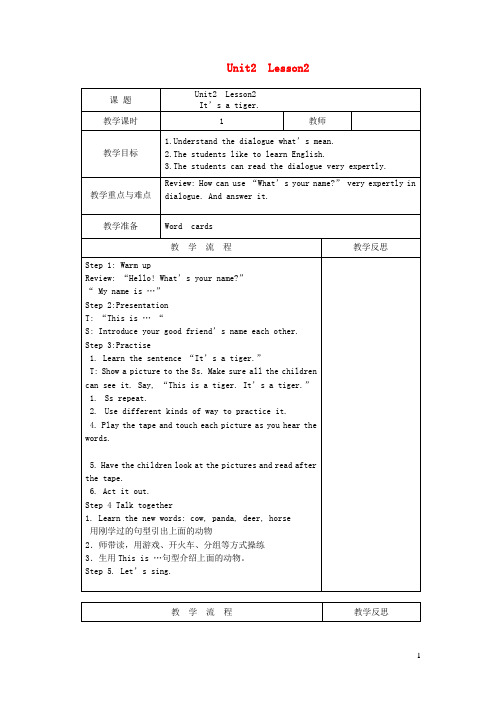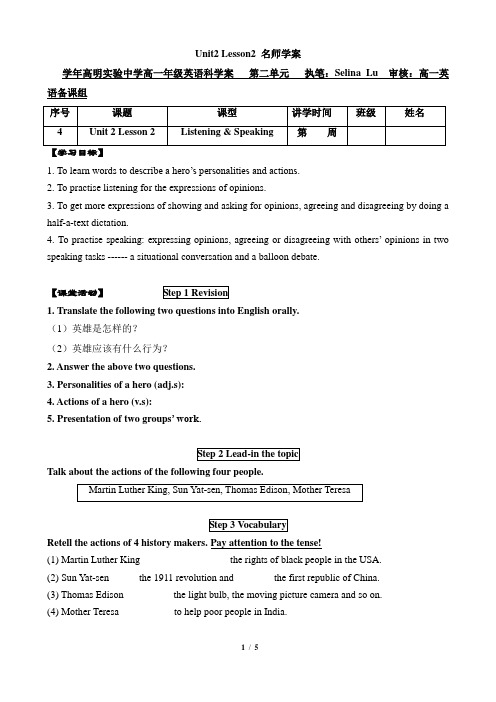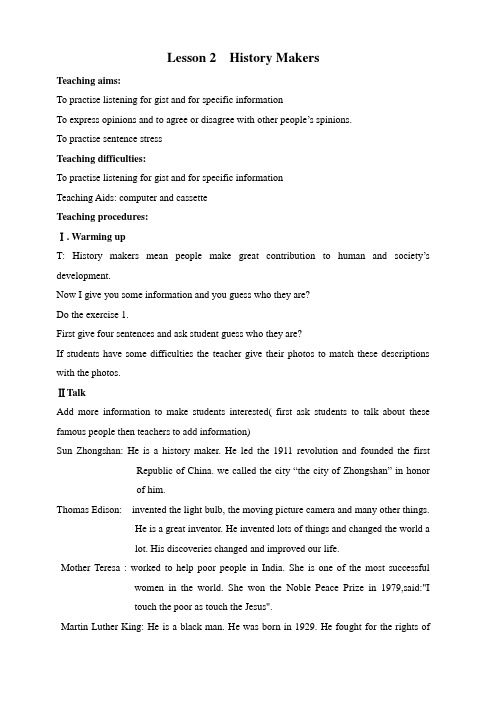Unit2 Lesson2学案
- 格式:doc
- 大小:54.50 KB
- 文档页数:4

Unit2 Lesson2Unit 5教学反思Unit 5 Let’s eat第一课时教学反思:教学过程中是一个师生交流和沟通的互动过程。
它既不是教师任意、刻意灌输的过程,也不是学生学习复制、被迫接受知识的过程。
它是学生生动活泼的生活,是师生共同发现和体验的过程,师生情感上的水乳交融是这种过程的基本体现。
在这里教师不是一个居高临下的长者,不是“传道、授业、解惑”的智者,教师是一个普通的学生学习的设计者、辅导者、参与者。
在这样的教学活动中,不只是学生,教师也同样会获得愉快的体验。
在这堂课的教学中,以“购物”游戏贯穿于始终。
让学生在活动中体验学习英语的乐趣。
培养学生的交往合作能力和语言表达能力。
Unit 5 Let’s eat第三课时教学反思:教师引导学生采取集体统计和个人采访相结合的方法进行活动,给学生展示自我的空间,又增强了学生之间的友好团结,提高了学习效率。
歌曲的教学教师同样注重为学生扫清难点,创设情景,使学生在音乐中感受“野餐”的愉悦,学习英语的乐趣。
Unit 5 Let’s eat第四课时教学反思:鼓励学生大胆表达自己想要喝的饮料或食物,操练句型。
当学生掌握了Can I have some…?句型后,教师提示学生用别的物品来替换食品饮料,真正地做到活学活用。
整个教学过程做到了循序渐进,由浅入深,同时启发了学生的创新精神Unit 5 Let’s eat第五课时教学反思:本课时的教学重点放在了Let’s do部分,采取多种形式开展活动和游戏,引导学生练习和运用所学的单词,吸引了学生的注意力,避免为学单词而学单词的枯燥。
形式活泼多样,学生玩中学,学中用,有助于教学目标的实现。
Unit 5 Let’s eat第六课时教学反思:学习歌谣前,略讲歌谣词意,在讲解dinner time的同时教给学生breakfast和lunch 的英语表达,有助于扩大学生的词汇量。
歌谣的操练采取了学生编演、小组比赛的形式,活跃了课堂气氛。

Unit 2 Sports and FitnessLesson 2 Running and Fitness【学习目标】1.掌握并熟练运用本课重点词汇和句型。
2.分析文章中的长难句,判断复合句的类型。
【学习重难点】能够在具体语境中熟练运用词汇和句型。
【学习过程】一、重点词组。
1.对某人的答复 _____________________________________2.像感冒常见的疾病 _________________________________3.继续保持 _________________________________________4.感到失望 _________________________________________5.助你保持健康预防疾病 _____________________________6.使—振作,高兴 ___________________________________7.增加血液流动 _____________________________________8.关于跑步的指导 ___________________________________9.增强免疫系统 _____________________________________10.跑步三原则 ______________________________________11.减少严重健康问题的风险 __________________________12.制定能实现的目标 ________________________________13.坚持到底 ________________________________________14.对健康有害 ______________________________________二、分析长难句,判断复合句类型。
1. You are also somebody who worries about getting sick.2. Besides, anybody who is feeling down, can go for a run to cheer themselves up.3. Even a thirty-minute run will provide relief from any aches or tension that you may be suffering due to stress.4. Draw up a training plan that is right for you.5. Make sure you are running the right amount that your heart, musclesand bones can take without getting hurt.6. Hang in there and tell yourself that it will get easier with time.三、重点词汇。

人教PEP四年级英语上册教案unit2 my schoolbagLesson 11Teaching Aims1.Remember and write the following letters and words well: Oo Pp Qq Rrbook ruler pencil-case2.Solve the problem with the new words in this unit, for example fill the blank, ect.Teaching Aidsa tape-recorder some cardsKeys and difficulties1)4-skill letters and words:Oo Pp Qq Rrbook ruler pencil-case2)New words: queue rice quietSteps1) OrganizationSay "Hello" to everyone, "Let's begin our class."2) RevisionRevise the new words that they’ve learned in this unit.3) Shopping gameThe teacher ask the students” Whether there is someone who like go shopping with his mother in the market. Stick the card on the board and ask the students to act “ON SALE 50% OFF”.4)Do the exerciseLet them look at the book at page of 23 and listen to the tape.Then let them see the second part and see what they are, and fill blank with the words .At last, the teacher check them..5.Class work and homework1)listen 、 read and write the letters and words:Aa Bb …… Oo Pp Qq Rrbook ruler pencil-case2) Listen to the tape and master the dialogues what they’ve learned.6.NotesLesson12Teaching Aims1.Understand the main idea of the story according to seeing the pictures.2.Sing a song named “Books and pencils”Teaching Aidsa tape-recorder , some pictures .Difficulty and Key points1) Some phrases are difficult :Be made of the inventor of paper put away2) Understand the following phrases:Put away have a good dream take outSteps1) OrganizationA: greetingsB: songs and chant2) Good to knowAsk students whether they know who invented paper. Tellthem the knowledge about invention of paper.4) StoryFirst ask the students to see the pictures and guess the main idea.Choose 3 students to retell the story. And then the teacher tell the story. Let them read after the tape.5) SongA: read the sentences of the song.B: Listen to the tape and learn to sing the song.C: sing the song with clapping hands 3 times.5. Homework1 ) Revise the dialogues of this unit.2 ) Sing the songs.1.Teaching notes。

(沪教牛津版)三年级英语下册教案Module3Unit 2 NoisesThe second period一、主要新授内容(New contents)1.Vocabulary: waves2. Structures: Do you like these noises?/ Do you like this noise? Is this noise loud/quiet?二、学习目标(Learning objectives)1. 通过Do you like these noises?/ Do you like this noise? / Is this noise loud/quiet?的询问来了解学生对生活中各种声音的喜好,培养学生的表述能力。
2. 学习新词wave及其复数形式。
3.通过整合以前有关Noises这一主题的内容,培养学生观察生活,热爱生活,关心周围事物的生活态度。
三、教学建议(Teaching Suggestion)1、任务前期准备阶段(Pre-task preparation section)Activity 1 (Song)1.教学辅助:1)录音机2.活动过程(Process)Activity 2 ( Revision)1、活动过程(Process)2.任务中期实施阶段(While-task procedure section)Activity 1 (Ask and answer)1、教学辅助(Aids)1) 图片 2)录音机2、活动过程(Process)Activity 2 ( Read and spell )1、教学辅助(Aids)1)图片2.活动过程(Process)Activity 3 ( Tick and answer )1、教学辅助(Aids)1)图片2.活动过程(Process )3. 任务后期完成阶段(Post-task activity section )Activity 1(Do a survey )1、教学辅助(Aids)1)调查表2.活动过程(Process )Activity 2(Noises around us)1、教学辅助(Aids)1)调查表2.活动过程(Process)。

Unit2 Lesson2 名师学案学年高明实验中学高一年级英语科学案第二单元执笔:Selina Lu 审核:高一英语备课组1. To learn words to describe a hero’s personalities and actions.2. To practise listening for the expressions of opinions.3. To get more expressions of showing and asking for opinions, agreeing and disagreeing by doing a half-a-text dictation.4. To practise speaking: expressing opinions, agreeing or disagreeing with others’ opinions in two speaking tasks ------ a situational conversation and a balloon debate.【课堂活动】1. Translate the following two questions into English orally.(1)英雄是怎样的?_________________________________________________(2)英雄应该有什么行为?___________________________________________2. Answer the above two questions.3. Personalities of a hero (adj.s): _________________________________________________4. Actions of a hero (v.s): _________________________________________________5. Presentation of two groups’ work.Talk about the actions of the following four people.Retell the actions of 4 history makers. Pay attention to the tense!(1) Martin Luther King _________________ the rights of black people in the USA.(2) Sun Yat-sen _____ the 1911 revolution and _______ the first republic of China.(3) Thomas Edison _________ the light bulb, the moving picture camera and so on.(4) Mother Teresa __________ to help poor people in India.1. Listen to 4 students talking about the 4 history makers. And then fill in the blanks.Well, I (1) _________ Mother Teresa is important, because she spent her whole life working with poor and sick people.I’m sorry, but I (2) ______________. (3) ______________, Dr Sun Yat-sen is very important. He led the 1911 revolution and founded the first republic of China.Yes, (4) ____________, but I think Thomas Edison is important, too. He created so many machines and inventions that we still use today.I (5) _______ with you, but (6) ___________, I think Martin Luther King is also quite important, because he fought against racism and his actions changed American society.2. Look at the 6 expressions you ’ve heard. What kind of expressions are they?We can use them to express ____________________________________________3. Can you list more expressions? One example has been given.1. Do you agree with the following statements? Tick the ones you agree!□ Your English teacher Selina is smart. □ Hitler (希特勒) is cruel.□Spiderman is violent. □ Mother Teresa is generous. □ Yang Liwei is brilliant. □ Boys are better than girls. □ Living in the city is better than in the country.2. How do you express your feelings in English if you agree or disagree with someone ’s opinions? Please list out the expressions!your worksheet with sentences.1. Expressions for Agreeing1. Sample Situation1) Student A, B are policemen:We should ban (禁止) motorcycles in Gaoming. Because ____________________ 2) Student C, D are motorcyclists:We should not ban motorcycles in Gaoming. Because _____________________From the following 2 situations, please choose ONE to express your opinions, agreeing or disagreeing.Situation 11) Student A, B are students: Making friends on the Internet is good. Because __________2) Student C, D are the parents: Making friends on the Internet is bad. Because __________Situation 21) Student A, B: summer is the best season of the year. Because _____________2) Student C, D: winter is the best season of the year. Because _____________3. Criteria (评价标准) for the Situational Conversation:2. ____________ organized the Long March and founded the People's Republic of China (PRC).3. ____________ fought for good relationships between China and other countries.4. ______________ opened up and reformed (改革) the economy(经济) of China.I think ______ is the most important / the greatest person in history.Personally, ______ made greatest contributions.【推荐作业】The following 5 questions may help you.1. What is she?2. What do you think of her?3. What did she do?4. Does she have the personalities of a hero?5. Are her actions worth admiring?【课后反思】Listening1. What do you think of the listening you have done today?□Excellent □Very good □Quite good □Not bad □Should be improved2. What listening skills did you use today?___________________________________________________________________3. What are your difficulties in getting information when listening to the interview?□The speakers/my partners speak too fast. □There’re many new words for me.□I don’t know what I should do. □The tasks are too difficult to complete.Other difficulties: ____________________________________________________4. How can you improve your listening in the future? Tell me your plan!___________________________________________________________________Speaking1. Do you like the speaking activities you have done today? □Yes □No. Why or why not? _______________________________________________________2. What do you think of the job you have done in the speaking today?□Excellent □Very good □Quite good □Not bad □Should be improved3. Were you active? □Yes □No. Why or why not?___________________________________________________________________4. What are your difficulties in your speaking?□I’m afraid of making mistakes. □I can’t speak very fluently.□I’m not interested in the topic. □My partner doesn’t want to speak.□I want to say more, but I can’t find correct words to express my feeling.□I don’t think I have enough time to get ready. □The speaking tasks are too difficult for me. Other difficulties: _________________________________________________5. Did the expressions help you when you are speaking? □Yes □No. Why or why not? Will you use them in your future speaking? _________________________________________________6. How can you improve your speaking in the future? Tell me your plan!___________________________________________________________________。

Lesson 2 History MakersTeaching aims:To practise listening for gist and for specific informationTo express opinions and to agree or disagree with other people’s spinions.To practise sentence stressTeaching difficulties:To practise listening for gist and for specific informationTeaching Aids: computer and cassetteTeaching procedures:Ⅰ. Warming upT: History makers mean people make great contribution to human and society’s development.Now I give you some information and you guess who they are?Do the exercise 1.First give four sentences and ask student guess who they are?If students have some difficulties the teacher give their photos to match these descriptions with the photos.ⅡTalkAdd more information to make students interested( first ask students to talk about these famous people then teachers to add information)Sun Zhongshan:He is a history maker.He led the 1911 revolution and founded the first Republic of China.we called the city “the city of Zhongshan” in honorof him.Thomas Edison: invented the light bulb, the moving picture camera and many other things.He is a great inventor.He invented lots of things and changed the world alot. His discoveries changed and improved our life.Mother Teresa : worked to help poor people in India. She is one of the most successful women in the world. She won the Noble Peace Prize in 1979,said:"Itouch the poor as touch the Jesus".Martin Luther King:He is a black man. He was born in 1929.He fought for the rights ofblack people in the USA.He devoted his life to equality of theblack. He won the prize of Nobel Peace.Are they history makers? Why?S:Teacher draw a conclusion: Yes, they actions did much to advance society. They make things so important that it will be recorded in the history book. They set examples to us.ⅢListen to learnHow to express agree and disagree?First ask students to express agree and disagree then read these wordsagree, think, you’re right, don’t agree, in my opinion, personallyDo the exercise 2Play the cassette for students to listen first, before looking at the Function File. See how much students can remember from the first listening.Students listen again, fill in the blanks with the key words .ⅣListeningRead through the Listening Strategies with the students and show students Key words to see if they can guess the meaning of these words.Ask students to pronounce the Key Words. One of purposes is that can then check if their pronunciation is correct as they listen to the tape. The other purpose is to remember these words to understand the radio Programme better.Do the exercise 5Students read through the sentences and predict what the answers are.Students listen to the cassette and see if their predictions are correct.As you check students’answers, ask them to correct the false sentences and make them true.ⅤPronunciation: stressAsk students to read the four sentences and predict where the stressed will occur in sentences. They listen to the cassette and see if they were correct.Play the cassette again for students to repeat the sentencesⅥSpeakingGive students time to read about some famous people. They take turns to choose a hero andask and answer three questions about their hero. Encourage students to use an interview approach.ⅦHomeworkWhat can you learn from the heroes introduced in this unit?Write down your views and explain them to your partner.。
Unit 2 Teachers【第二课时】Lesson 2【学习目标】1. 能够听懂、会说用来询问某位教师教哪门科目的功能句:What does he/she teach? 及其答语:He/She teaches …初步学会在恰当的情境中运用它们。
2. 能够根据问句写出答语。
【学习重难点】1. 能够听懂、会说用来询问某位教师教哪门科目的功能句:What does he/she teach? 及其答语:He/She teaches…2. 在恰当的情境中运用What does he/she teach?及其答语:He/She teaches …【知识探究】一、导学:1. 热身(唱一唱)Let’s enjoy a song、If you can sing, you can sing.2. 玩游戏。
Let’s play a guessing game、Listen carefully、She is a student in our class、She is 10 years old、She is slim and pretty、She has long straight hair、She isin a yellow shirt、Who is she?二、知识构建:1. 学习(学一学,练一练)(1)Look, listen and answer两人一组进行问和答,班内展示,及时评价。
Look at the picture、Where are they?(观看课件,出现A部分的图片)They are on the playground、What are they doing?Which two teachers are they talking about? Let’s listen and circle the two teachers.(认真听A部分录音)听录音,圈出2个老师。
班内校正,及时评价。
T: Let’s read and finish the chart.(点击课件,出现表格)(2)读课文,完成表格,班内校正,及时评价。
Lesson Plan: Unit 2, Lesson 2 - Rules of the GameObjectives:Students will be able to understand and discuss the importance of rules in sports.Students will learn and practice new vocabulary related to sports rules.Students will engage in a group discussion about rules and fairness in sports.Materials:Textbook: Unit 2, Lesson 2 - Rules of the GameHandout: Vocabulary exerciseWhiteboard and markersTimerProcedure:Warm-upBegin the class by asking students to discuss in pairs or small groups about their favorite sports and what rules they know about them.After a few minutes, ask a few students to share their answers with the whole class.Vocabulary exerciseDistribute the handout with vocabulary related to sports rules.Ask students to work individually or in pairs to match the words to their definitions.After a few minutes, review the answers as a class and clarify any doubts.Reading and comprehensionAsk students to read the text in their textbook about the importance of rules in sports.After reading, ask students to answer the comprehension questions on the textbook.Review the answers as a class and discuss any points of interest.Group discussionDivide the class into groups of 4-5 students.Give each group a scenario where a rule in a sport is broken or not enforced.Ask each group to discuss the scenario and how it relates to fairness in sports.After 5-10 minutes of discussion, ask each group to share their thoughts with the class.Wrap-upReview the key points of the lesson, emphasizing the importance of rules in sports and fairness for all players.Homework:Ask students to write a short paragraph about a time when they or someone they know experienced unfairness in sports due to a rule being broken or not enforced.Homework:Write a short paragraph about a time when you or someone you know experienced unfairness in sports due to a rule being broken or not enforced. Describe the situation and how it made you feel. Reflect on what could have been done to prevent the unfairness.。
Unit2 Superhero Lesson 2 History Makers编者:张玎洁教学目标:1. To master some important words and expressions.2. To be able to talk about heros and famous people3. To practise oral English.教学重点与难点:需要掌握的语法:to practise using Past Participles as attributive in sentences需要掌握的词语:revolution,found,in one's opinion,lead,promote,protest,begin with,march,struggle,agree withseparate...from..., let out, because of, be related to需要掌握的句型:1. His first victory was to win the equal rights for blacks to sit on buses.2. Nelson Mandela is one of the world's most famous people.3. In 1849,she became the first woman ever to receive a medical degree in the USA and showed people that women could become doctors, just like men.4."I have a dream that my four little children will one day live in a nation where they will not be judged by the colour of their skin, but by the content of their character." said Martin Luther King.5. He went to prison sixteen times for organising protests.Part I New words and expressions:1.revolution n.①革命;剧烈的变革②完全改变The army officers led a revolution against the king.军官们领导了一次反国王的革命。
Air travel has caused a revolution in our way of living.空中旅行使我们的生活方式完全变了。
【拓展】bring about the revolution 引发革命revolutionary (adj.) 革命的revolutionist (n.) 革命家2.found v.①建立,建筑②出席,开办The castle is founded on the rock.The rich bussinessman founded a hospital and a school.3. in one's opinion = in one's view 依某人看来eg: In my opinion, you are wrong. 依我看,你错了。
give/express one's opinion on/upon 对........表达某人的看法change one's opinion on/upon 改变某人对........的看法have a good/bad/high/low opinion of 对.........评价好/坏/高/低public opinion 公众舆论eg: Her boss has a good opinion of her. 老板对他评价不错。
He expressed his opinion on the problem. 他表达自己对此事的看法。
4. lead (vt. /vi.) 领导,引导;致使;(道路等)通向;导致lead sb. to + n. 带领某人通往........lead to +n. 通往,导致lead sb. to do sth. 使某人做某事lead a .... life 过着.........的生活eg: The street leads you to the station. 你沿着这条街走就可以到达车站了。
All roads lead to Rome. 条条大路通罗马。
What led you to believe it? 什么使你相信了它?He led a hard life. 他的日子过得很苦。
5.promote vt. 提升(常与to连用);促进增进宣传推销(商品)eg: Our teacher has been promoted to head-master.Do you have any idea how to promote the sales of this product?The organization works to promote friendship between nations.【短语】promote growth / understanding 促进增长/了解promote a new product 促销新产品promote physical culture 发展体育运动6. protest n. 反对抗议v. 申辩反对eg: The people made a protest.The tourists protested about the bad service at the restaurant.【短语】under protest 不情愿地不服气地without protest 心甘情愿地毫无怨言地7.begin with由….开始eg: He made a speech beginning with “Good morning”.【短语】to begin with 首先第一eg:To begin with ,I don’t feel well. Besides , I don’t have muc h time.8. march vi. 走过,通过n. 行进行军March 三月eg: Soldiers were marching up and down.The army began their march to the coast.9. struggle n. 斗争挣扎eg: The Emperor lost 1000 men in the struggle.【短语】struggle with 与某人并肩作战struggle for 为某事而奋斗struggle against 跟某人斗争10. agree with 同意I quite agree with what you said.agree with doing sthI ageree with going to swim tomorrow.agree with sbI agree with you.This kind of food doesn’t agree with me. (气候或食物)适合【辨析】agree to 赞成(计划、提议、安排等)I agreed to the plan.(proposal/suggestion/arrangement)agree on 对某事取得一致意见,后跟具体协议的文件,行动等We agree on the question.Part II Key points in reading★重点句型1.His first victory was to win the equal rights for blacks to sit on buses. (page25.)他的第一次胜利是为黑人赢得了坐在公交车上的平等权利。
equal adj.①平等的②能胜任的③相同的,同样的Women fail to get the equal rights in some countries.He is equal to this work.=He is equal to doing this work..It is equal to me whether he comes or not.2. Nelson Mandela is one of the world's most famous people.(page25.)纳尔森·曼德拉是世界上最著名的人之一。
“one of + 复数名词”意为“...........之一”。
【拓展】one of + 复数名词+ 定语从句:(1)one of + 复数名词表示“...........之一”时,后跟的定语从句的谓语动词用复数形式。
(2)如果“one of + 复数名词+ 定语从句”前有the, the only, the very等词时,定语从句的谓语动词用单数形式。
eg: He is one of the students who have got the first prize in the school.他是学校中获得一等奖的学生之一。
He is the only one of the students who has got the first prize in the school.他是学校中唯一获得一等奖的学生。
3.In 1849,she became the first woman ever to receive a medical degree in the USA and showed people that women could become doctors, just like men.(page25.)在1849年,她成为了美国第一位获得医学学位的女性,并且向世人证明了女性也能像男性一样从事医生的行业。
(1)become 和show 是主语she的并列谓语动词。
(2)不定式短语to receive a medical degree in the USA作定语,修饰名词短语the first woman 。
【拓展】被修饰的名词前有序数词、形容词最高级或next, last, only, not a, the very等限定词时,该名词用不定式作定语。